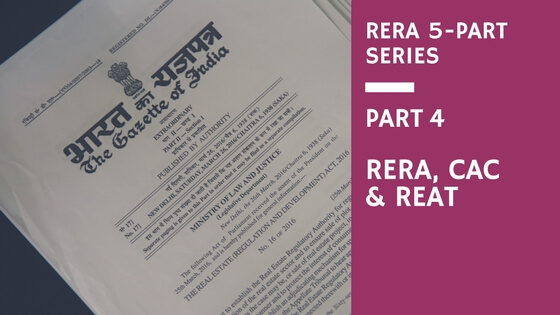
RERA Real Estate Bill 2017 – Part 4 – Regulatory Authority, Central Advisory Council & Appellate Tribunal
Common Questions and Clarifications on RERA 2017: Part 4
In Part 4 of this series, Chennai Dream Homes™ will aim to simplify information around the new RERA Real Estate Bill – specifically on the Real Estate Regulatory Authority, Central Advisory Council & Appellate Tribunal. We hope you find this useful.
This post series is divided into 5 parts.
Part 1 talked about the Basics of RERA.
Part 2 covered Registration of Real Estate Projects and Real Estate Agents under RERA Real Estate Bill.
Part 3 focused on Duties of the Promoters and Allottees in RERA Real Estate Bill.
Part 4 will focus on the Real Estate Regulatory Authority, Central Advisory Council & Appellate Tribunal. (this post)
Part 5 will focus on Offences, Penalties and Adjudication in RERA Real Estate Bill.
We will attempt to update this resource and adhere to appropriate marketing of property listings on our website as soon as it comes into full force and we have official information.
The original government document on RERA Gazzette Notification can be found here. (Source: Ministry of Housing & Urban Poverty Alleviation, Government of India)
Part 4 – Real Estate Regulatory Authority, Central Advisory Council & Appellate Tribunal under the RERA Real Estate Bill

(Source: The Economic Times)
A. RERA FAQs:
1. What is the timeline for establishment of the Regulatory Authority?
As per section 20, the Regulatory Authority under RERA Real Estate Bill is required to be established within 1 year of the commencement of the said section. As section 20 has been notified with effect from 1st May, 2016, the Authority is required to be established maximum by 30th April, 2017. However, for speedy implementation of the Act, section 20 empowers the ‘appropriate Government’ to appoint an interim Regulatory Authority, until the establishment of the full time Authority.
2. How are the Chairman and the Members of the Authority required to be appointed?
As per section 22 the Chairman and the Members of the Authority are required to be appointed by the appropriate Government on the recommendations of a Selection Committee comprising of the Chief Justice of the High Court (or his nominee), the Housing Secretary and the Law Secretary. The section also provides for the qualification etc. that are required for the appointment of the Chairman and the Members.
3. What are the important responsibilities of the ‘Regulatory Authority’?
Apart from the day to day implementation of the Act and the Rules and Regulations made thereunder, the immediate responsibilities of the Regulatory Authority are:
- Registration of real estate projects and the real estate agents
- Extension of registration of real estate projects and their revocation, if any
- Renewal of registration of real estate agents and their revocation, if any
As per section 34, the Authority is responsible to to maintain a website of records for public viewing of –
- all projects registered with the Authority including details of projects as specified in the Act and the rules and regulations – to be disclosed on the website;
- details of promoters with photographs of promoters;
- details of projects in case of revocation of registration or where any project penalized under the Act;
- details of agents registered under the Act including his/her photograph and also of those agents whose registration has been revoked.
- As per section 71, the Authority is required to appoint one or more ‘adjudicating officer’ in consultation with appropriate Government.
- As per section 85, the Regulatory Authority is required to notify Regulations within 3 months of establishment.
- As per section 32, the Regulatory Authority is also required to make recommendations on various matters for the growth and promotion of a healthy, transparent, efficient and competitive real estate sector.
4. How can a complaint be filed with the Authority for any violations under the Act?
Section 31 of the Act provides for filing of complaint by an aggrieved person with the Regulatory Authority. The form and manner and the fees payable for filing the complaint are to be specified by Rules to be made by the appropriate Government.
5. What is the time period within which the Authority is required to dispose of any matter that is brought to it for consideration?
Section 29 provides that the Authority should endeavour to dispose of the questions / complaints as expeditiously as possible but not later than sixty days from the date of filing the same. However, where it could not be disposed of during the said period the Authority is required to record its reasons for the same.
B. CAC FAQs:
1. What is the composition of the Central Advisory Council in RERA Real Estate Bill?
The Central Advisory Council, to be headed by the Union Minister for Housing, is a multi-member body comprising of representatives of specified Central Ministries, five representatives of State Governments to be selected by rotation, five representatives of Regulatory Authorities to be selected by rotation and any other central government department as notified.
The Central Advisory Council is also required to have representatives of consumers, real estate industry, real estate agents, construction labourers, NGOs, and academic / research institutions.
2. What is the role and responsibility of the Central Advisory Council?
The Central Advisory Council is required to advise the Central Government on matters relating to implementation of the Act, questions of policy, protection of consumer interest, foster growth and development of the real estate sector, and other matters as may be assigned to it by the Central Government.
C. REAT FAQs:
1. What is the timeline for establishment of the Appellate Tribunal under the RERA Real Estate Bill?
As per section 43 of the Act, the Appellate Tribunal is required to be established within 1 year of of the commencement of section 43. As section 43 has been notified with effect from 1st May, 2016, the Appellate Tribunal is required to be established maximum by 30th April, 2017. However, for speedy implementation of the Act, section 43 empowers the ‘appropriate Government’ to designate an existing Appellate Tribunal (under any other law in force) to function as an Appellate Tribunal under the Act.
2. How are the Chairman and the Members of the Appellate Tribunal required to be appointed?
As per section 46, the Chairman of the Appellate Tribunal shall be a sitting or retired Judge of the High Court. Section 46 also provides that the Appellate Tribunal shall comprise of at-least two Members – one of whom shall be a Judicial Member and the other shall be a Technical or Administrative Member.
As per section 46, the Members of the Appellate Tribunal are required to be appointed by the appropriate Government on the recommendations of a Selection Committee comprising of the Chief Justice of the High Court (or his nominee), the Housing Secretary and the Law Secretary. The section also provides for the qualification etc. that are required for the appointment of the Judicial / Administrative Members.
3. What are the important responsibilities of the Appellate Tribunal?
The Appellate Tribunal is a quasi-judicial body, which is empowered to hear appeals from the orders / decisions / directions of the Regulatory Authority or the Adjudicating Officer, as the case may be. The form and manner and the fees payable towards filing the appeal and the manner for hearing and disposing the appeal are to be provided by Rules to be made by the appropriate Government.
4. Can an appeal be filed against the decision or the orders of the Appellate Tribunal?
Any person aggrieved by the decision or order of the Appellate Tribunal can file and appeal with the High Court in the State.
5. What is the time period within which the Appellate Tribunal is required to dispose of the appeal?
Section 44 provides that the Appellate Tribunal should endeavour to dispose of the appeal as expeditiously as possible but not later than 60 days from filing the appeal. However, where the same could not be disposed of during the said period the Appellate Tribunal is required to record its reasons for the same.
We hope you enjoyed this series on RERA, CAC and REAT of the RERA Act.
Stay tuned for the final Part 5 of this series that will shed light on “Offences, Penalties and Adjudication in RERA“.
